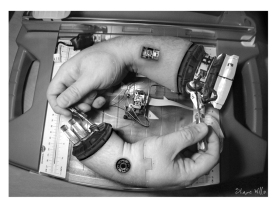We live in a curious time…
Complexity abounds. It’s all around us. For some, it’s within us. It’s certainly staring you in the face as you’re reading this, and, chances are, you don’t understand how it works.
Something to do with Ones and Zeroes…
Heck, I would argue that nobody on the face of the planet FULLY understands a computer anymore. Sure some can order parts on the internet and slap one together with relative ease, (hell, even I’m in that group), but who among men could go to a mountain, mine, refine, hone, craft, weld, assemble and create the thing from scratch?
Likely, not a-one of us.
Which seems like such a shame to me. Intriguingly knowing how each part of a system operates endows a person with an unparalleled perspective on how to improve it from within. But these days this all-encompassing comprehension simply isn’t possible — there’s just too much to know. Nobody has the free-time. Nobody has the money. Nobody has the memory…
And so, I can’t help but to wonder, isn’t it high-time we made a visit to the shop for an upgrade?
See, in general, and aside from computers, we live in a time of ever accelerated pacing and knowledge, (and, let me tell ya, that crazy train ain’t slowing down anytime soon), yet there are no more hours in the day than ever before for which to learn these concepts. If anything, there are less; being that we’re tethered to the innumerous necessary daily distractions which allow us to function within this world at all, I.E. Cell-phones, Computers and the lot. Today, more than ever, we desperately need to comprehend an ever-growing volume of complexity, and yet, today, more than ever, who has the time but yet to skim?
It’s an interesting modern paradox…
We need to be fast, lean and agile to compete — yet also we need to sit still, study, and thoroughly learn what’s going on in order to compete. It would seem that the snowballing concepts of mankind have finally hit a critical mass of sorts within the mind, they’ve seemingly caught up with our potential, and now the memory, attention-span, and longevity limitations of the human mind are all being highlighted — and they’re coming up short.
Today, a lot of fingers get pointed around.
It’s Greece’s fault for what’s happening to the Euro. It’s the 1%’s fault for what’s happening in America. It’s China’s fault for permitting outsourced labor. It’s the cartel’s fault that Mexico can’t truly be free. It’s Monsanto’s fault for causing malnutrition within the masses. It’s yo mamma’s fault for being so damn fat! Sorry — don’t know how that one got in there (Still though, she can use to lose a few). But, seriously, whose fault is it really? Furthermore, does fault even matter?
How about we just find a solution?
That’s the grown-up thing to do, right? It’s just… it’s tough — being that all the involved factors can’t possibly be known to any one individual, let alone be understood by all the rest thereafter, in order to verify said solution… So in truth, in order to find a solution to the world’s ails, we first must find a way to hold all the intrinsic factors in mind at once — which is currently impossible with the brain alone. Thus, in order to even begin brainstorming for answers, we need to first find a workaround.
That’s the real issue at hand here.
Easier said than done, right? Well, not really… There are at least three solutions which I can think of off the top of my head, and, being of the creative sort (much like you, good reader), likely many more still to be discovered. I’ve realized that the trouble lies not in conjuring solutions, rather, as I see it, the true trouble lies in getting people vested in pursuing these options. And so, here are but a few which we COULD (potentially) rally behind…
Solution #1: Enhance the mind
If the problem we face is an overwhelming amount of data, than a natural solution, from a strictly computational standpoint, would be to improve the hardware.
Sure, people tend to freak out about the thought of attaching circuitry to the mind in order to enhance its thoughts, but what new technology has not done precisely this? Think about it; “The Wheel”, the quintessential inaugural invention of mankind, was, in itself, an enhancement of the mind. It merely extended a thought, namely, “Ug want move faster”, into reality. Modern computers have merely continued this ancient legacy, as they perform myriad concurrent tasks, thousands of times faster than John Henry ever could have dreamed.
So why not just keep using computers?
We’ve been trying. But, like stated earlier, we’re reaching a breaking point. Computers are beginning to outpace us, and all the double-clicks, the bits of typing, and the looking from here to there on the screen are quickly dwarfing the need for the technology’s furthered progression. However, if you look at technology as another part of us — for it is only an extension of what we’ve invented, like the wheel, and thus IS US already — than we need to ensure that we, ourselves, can keep up with the growing speed of our devices. Meaning soon, “Having chips on the brain”, might imply more than simply thinking about that bag of Doritos (TM) in the cupboard.
Enter: the Singularity
The Singularity is a concept indicating a time when we’ll merge with the machines we’ve created. It’s already happening, and, if we wish to continue comprehending our world to the fullest, it might be necessary in maintaining the continuous growth of our culture. Thus far these circuits of the mind would be utilized mostly as a relay point to still existing physical computers, though I would speculate, as quantum computing continues to take strides in progress, that soon the paradigm of a, “physical computer”, will be nothing but a footnote in our history textbooks. That is, if we still have history textbooks.
(We will likely not have history textbooks…)
So, being that the growth of technology is measurable, it is not only likely that soon we will have to enhance our minds to keep up, it is inevitable — and also determinable as to when. All in all, making this option ‘one fine solution’ in addressing the problem of keeping up with the voluminous concepts of our modern world, as it’s certain to happen either way.
“Now, or later”, is our only real choice…
Solution #2: Trust
If the problem cannot be held in one mind alone, than, possibly, it can be shared across multiple expert minds.
Let’s say that you don’t buy into the idea of Doritos (TM) on the mind. Let’s say that you think we can solve all the modern ailments of the world with good old-fashioned elbow grease and honest cooperation. Let’s say, you feel that collaboration, without outside influence or bias, is actually possible as a means to reach resolution for an ever more complex world in the end.
Let’s say you feel we can trust others
Than, let’s say, I agree — conditionally. We’ll surely need a back-up. We’ll need a way of double checking ourselves against the overwhelming complexity we face. We’ll need to ensure that we’ve, including myself, not acted emotionally whatsoever. For this, we’ll need help.
Meet, Eric Berlow
Utilizing an outside system, such as Eric’s TED talk suggests, would be the perfect accompaniment for this type of solution, as it would keep everyone on task and honest within the method’s constraints. We would require varying trusted experts, in all respective fields, to continuously conjure additional factors for which to plug into the model he suggests (it’s only about four minutes if you didn’t watch it — and you should!), and in this way we could invariably find the real buttons for change, and act upon them more prudently, generating in the end, true, long-term and viable solutions to the world’s ever perplexing plot-line.
(I bet the butler did it!)
Solution #3: Forced Evolution
If our current brain isn’t up to task any more, than why not simply engineer a better one?
Genetic modification is what I’m talking about here, my people, and it’s my final, “Off the top of my head”, answer toward resolving the issue of our ever-increasing complexity, and the enduring, growing need for our complete comprehension of it.
In truth, this final solution is actually my favorite — mostly because it freaks people out.
In the eyes of the public, genetic modification is synonymous with maniacally laughing evil scientists, ginormous bolts of lightning slamming into over-sized Tesla coils, and their invariably resulting, freaky Snooki–esque monsters, but that needn’t be the case. Ever since Craig J Venter successfully sequenced the human genome I’ve been dreaming of the day that we could engineer and alter life, and soon that might become a reality.
Precisely, Doctor Zoidberg
Since the late 70’s we’ve been engineering life from the ground up within bacteria, and lately this endeavor has become much more advanced. Recently it’s been branching out into ever more complex species, and soon (were we to make this our goal) it’s speculated that we could alter and improve our very own DNA.
For instance: How about a triple helix? How about an epigenetic code that we could alter at will. How about regenerative tissues, decreased need for oxygen, increased longevity, or even, as the good Doctor mentioned, how about another brain hemisphere?!? If we merely remove our collective biases from the equation, and our inherent assumptions about morality, we might actually be able to engineer a better version of ourselves…
Humanity Mach 2 — Version 1, 2, 3.1, 3.4, 4.2!
To me, as funny as this might sound, this seems like the most prudent and natural solution of them all. Bioengineering would be a way for us to remain organic, and, rather than having two communicating systems within the body, would keep us whole.
Cause I don’t know about you all, but I have plenty of voices talking to me already up in my brain…
We could systematically make improvements to the form and function of humanity, and we could have multiple versions of ourselves to colonize ever more hostile worlds around the universe. I imagine designer people, changed on a generational basis, and all with a fresh perspective on the story of life itself.
In this way we might finally understand life, and what it would take to help everyone thrive, all throughout the Universe!
So, anyway, what do you all think?
Is it time for an upgrade?
~J






